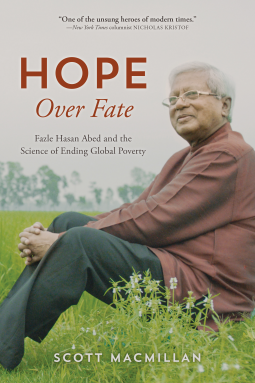
Hope Over Fate
Fazle Hasan Abed and the Science of Ending Global Poverty
by Scott MacMillan
This title was previously available on NetGalley and is now archived.
Buy on Amazon
Buy on BN.com
Buy on Bookshop.org
*This page contains affiliate links, so we may earn a small commission when you make a purchase through links on our site at no additional cost to you.
Send NetGalley books directly to your Kindle or Kindle app
1
To read on a Kindle or Kindle app, please add kindle@netgalley.com as an approved email address to receive files in your Amazon account. Click here for step-by-step instructions.
2
Also find your Kindle email address within your Amazon account, and enter it here.
Pub Date Aug 01 2022 | Archive Date Aug 01 2022
Rowman & Littlefield | Rowman & Littlefield Publishers
Talking about this book? Use #HopeOverFate #NetGalley. More hashtag tips!
Description
Nicholas Kristof of The New York Times called him “one of the unsung heroes of modern times.” Fazle Hasan Abed was a mild-mannered accountant who may be the most influential man most people have never even heard of. As the founder of BRAC, his work had a profound impact on the lives of millions. A former finance executive with almost no experience in relief aid, he founded BRAC, originally the Bangladesh Rehabilitation Assistance Committee, in 1972, aiming to help a few thousand war refugees. A half century later, BRAC is by many measures the largest nongovernmental organization in the world—and by many accounts, the most effective anti-poverty program ever.
BRAC seems to stand apart from countless failed development ventures. Its scale is massive, with 100,000 employees reaching more than 100 million people in Asia and Africa. In Bangladesh, where it began, Abed’s work gave rise to “some of the biggest gains in the basic condition of people’s lives ever seen anywhere,” according to The Economist. His methods changed the way global policymakers think about poverty. By the time of his death at eighty-three in December 2019, he was revered in international development circles. Yet among the wider public he remained largely unknown. His story has never been told—until now. Abed avoided the limelight. He thought his own story was of little consequence compared to the millions of women who rose from poverty with BRAC’s help, bending the arc of history through their own tenacity and grit. The challenges he faced often seemed insurmountable. Abed’s personal life was a tapestry of love and grief—a lover’s suicide, a wife who died in his arms. He was a taciturn man with a short temper that erupted on rare occasions. Many of his ventures failed, but Abed persevered. This book is also the biography of an idea—the idea that hope itself has the power to overcome poverty. “For too long, people thought poverty was something ordained by a higher power, as immutable as the sun and the moon,” Abed wrote in 2018. His life’s mission was to put that myth to rest. This is the story of a man who lived a life of complexity, blemishes and all, driven by the conviction that in the dominion of human lives, hope will ultimately triumph over fate.
Scott MacMillan is the director of learning and innovation at BRAC USA, an affiliate organization of BRAC, where he has worked since 2011. A former journalist, he served as the speechwriter of Sir Fazle Hasan Abed, the founder of BRAC, prior to Abed’s death in 2019. He lives in Connecticut with his wife and daughter, along with a cat, dog, and four horses.
A Note From the Publisher
: This title views best in tablet-style eReaders.
This is a set of uncorrected page proofs. It is not a finished book and is not expected to look like one. Errors in spelling, page length, format and so forth will all be corrected by the time the book is published several months from now. Photos and diagrams, which may be included in the finished book, may not be included in this format. Uncorrected proofs are primarily useful so that you, the reader, might know months before actual publication what the author and publisher are offering. If you plan to quote the text in your review, you must check it with the publicist or against the final version. Please contact reviews@rowman.com with any questions. Thank you!
This is a set of uncorrected page proofs. It is not a finished book and is not expected to look like one. Errors in spelling, page length, format and so forth will all be corrected by the time the book is published several months from now. Photos and diagrams, which may be included in the finished book, may not be included in this format. Uncorrected proofs are primarily useful so that you, the reader, might know months before actual publication what the author and publisher are offering. If you plan to quote the text in your review, you must check it with the publicist or against the final version. Please contact reviews@rowman.com with any questions. Thank you!
Available Editions
| EDITION | Hardcover |
| ISBN | 9781538164921 |
| PRICE | $29.95 (USD) |



